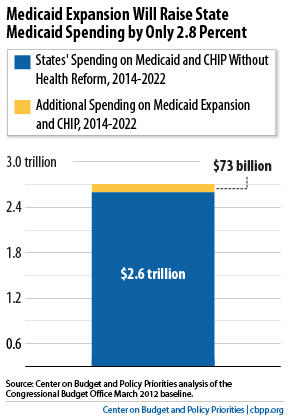BEYOND THE NUMBERS
Texas Governor Rick Perry says that the health reform law’s Medicaid expansion would “threaten even Texas with financial ruin.” Florida Governor Rick Scott calls the provision a “massive entitlement expansion” and claimed it will cost Florida $1.9 billion a year (his staff has since admitted the figure was overstated).
Our revised report provides a reality check for such scare talk, explaining that the Medicaid expansion will cover 17 million low-income people at a very modest cost to states — and that savings in state-funded services for the uninsured will offset part (and possibly all) of that cost.
Here are the basic facts:
- The federal government will pick up nearly 93 percent of the cost of the Medicaid expansion over its first nine years (2014-2022), according to the Congressional Budget Office (CBO).

- States will spend just 2.8 percent more on Medicaid with the expansion than they would have without health reform, CBO finds (see chart).
- This 2.8 percent figure overstates the net impact on state budgets because it doesn’t reflect the large savings that states and localities will realize in health care spending for the uninsured. The Urban Institute estimates that states will save between $26 and $52 billion in this area from 2014 through 2019. The Lewin Group estimates the state and local savings at $101 billion.
Critics charge that state budgets will take a big hit as many people who are already eligible for Medicaid but unenrolled sign up as a result of health reform. The federal matching rate for covering these people (57 percent, on average) is much smaller than the match for covering people who become eligible under the Medicaid expansion (which will be 100 percent for the first three years and no less than 90 percent on a permanent basis). But the CBO estimates — as well as other independent analyses — already account for the cost to states of covering the already-eligible individuals who will enroll.
Moreover, states will incur part of that cost regardless of whether they take up the Medicaid expansion, because other parts of health reform, like the requirement to have health coverage, will boost Medicaid enrollment among those already eligible. So the added cost of the Medicaid expansion is much smaller than critics generally claim.
In short, as we’ve said before, the Medicaid expansion is an extremely good deal for states — and for their low-income uninsured residents.
